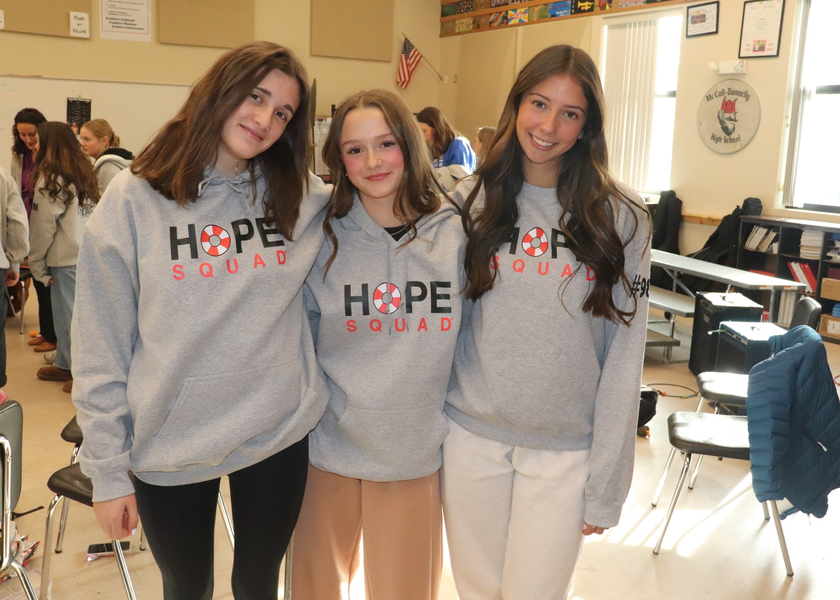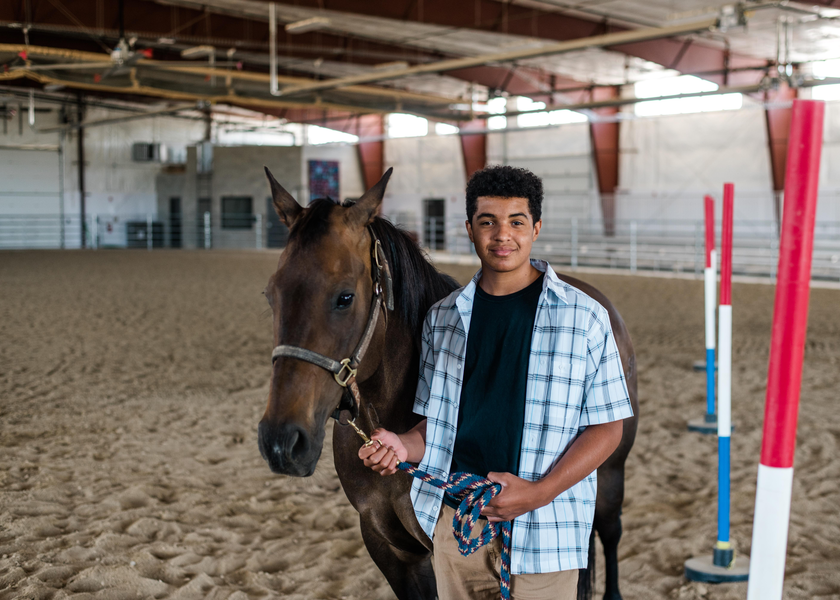Community Health & Engagement
St. Luke’s community partners pair up to help prevent suicide and support mental health initiatives

Hope Squad at McCall-Donnelly High School
By Dave SouthornLast Updated November 4, 2025
How St. Luke’s, community partners are pairing up to help prevent suicide and support mental health initiatives
Across St. Luke’s hospitals, clinics and communities, we see the ongoing need for awareness, access, and connection. That’s why, in addition to sharing resources and stories of hope each September, St. Luke’s continually invests in local partnerships and programs that strengthen resilience and reduce the risk of suicide.
Here are just a few of the organizations St. Luke’s supports, making an impact across Idaho.
2C Kids Succeed
In Canyon County, prevention starts early by helping children feel seen, supported and valued.
The 2C Kids Succeed community collaborative builds healthy, resilient communities by increasing awareness of mental health and substance use. It also aims to strengthen protective factors like having trusted adults and feeling valued. During Suicide Prevention Month, the group worked with Nampa Police Department’s school resource officers to share a youth-focused video reminding students they matter.
St. Luke’s supports the collaborative alongside other community partners, including Nampa Police. Recent efforts have included “high-five greetings” at school entrances, chalk messages of hope and stickers that remind students that tomorrow needs them.
Idaho Youth Ranch
When young people face serious emotional or behavioral challenges, Idaho Youth Ranch ensures they receive the right care at the right time.
Suicide is the second-leading cause of death among youth ages 10-24, according to the Center for Disease Control. In Idaho, where the Treasure Valley faces a shortage of adolescent mental health providers, Idaho Youth Ranch fills critical gaps in care.
With support from St. Luke’s Community Health Improvement Fund (CHIF), the Idaho Youth Ranch served 784 youth across four cornerstone programs in 2025, surpassing its goal of 675.
St. Luke’s played a key role in launching a new residential center in 2023 by providing behavioral health expertise and early funding. The 64-bed facility now offers long-term treatment for youth ages 11-17 with serious emotional disturbances who previously had to seek care out of state. These programs create a continuum of care that nurtures hope, healing and resilience while reducing suicide risk.

Teens are given different outlets, such as caring for animals.
Hope Squad
In Idaho’s mountain communities, schools are becoming safe havens for connection thanks to peer-to-peer initiatives.
The Hope Squad, part of the West Central Mountain Youth Advocacy Coalition, is a school-based suicide prevention program that empowers students to support one another. Classmates nominate peers to the squad, where they receive training to recognize warning signs and connect friends to help.
St. Luke’s provides CHIF funding and team members serve on the coalition’s board. The program operates in eight schools across Donnelly, McCall and Meadows Valley.
A review of 2023–24 Mental Health Referral Forms showed that more than 95% of referrals came from non-Hope Squad members, suggesting that more students are speaking up and reaching out in communities where Hope Squads are active.
You Are More
In Elmore County, students have transformed personal loss into a movement of compassion.
After Mountain Home High School lost a student to suicide in 2017, peers launched projects to raise awareness and install bright yellow Buddy Benches, safe places for anyone feeling lonely to find connection. This May marked the installation of the ninth bench, each engraved with the message: “No one else can play your part.”
The movement has grown and evolved. The #YouAreMore (YAM) campaign was started by a student inspired by her sister’s mental health journey after an injury. Every school year, shirts with the “You Are More” message are worn by students of all ages, reminding students to care for themselves and others. This year, new “Be Kind to Your Mind” shirts, designed by a local artist, were available.
St. Luke’s has supported these efforts through funding, guest speakers, and by featuring the YAM team at the annual CHIF celebration, helping spread their message of empathy and resilience.
Because Kids Grieve
Healing doesn’t stop at prevention: Supporting children through grief is another vital piece of suicide prevention and postvention.
According to the Childhood Bereavement Estimation Model in 2023, more than 1 in 15 Idaho children will lose a parent or sibling by the age of 18. Yet most grief programs focus on adults.
For 11 years, St. Luke’s has partnered with Because Kids Grieve to help children and teens ages 6-17 navigate loss. St. Luke’s hosts the organization’s annual Fall Bereavement Conferences in Boise and Twin Falls, which train social workers, counselors, educators, and others to support grieving youth.
“The conference helps provide the vital parts of the community safety net where children and teens know they're not alone,” said Michael Seward, Because Kids Grieve board president.
In addition to the conference, Because Kids Grieve offers weekend and day camps, monthly Kids2Kids meetings and the Tree of Remembrance event, creating spaces where children learn healthy coping strategies and discover they’re not alone.
Sources of Strength
In the Wood River Valley, students and educators are building protective factors and belonging through Sources of Strength, an evidence-based suicide prevention program.
As a principal funder and partner in the Communities for Youth initiative, St. Luke’s supports data-driven strategies that respond to local needs. Communities for Youth surveys reveal that many students in the Wood River area struggle with belonging and lack relationships with trusted adults.
“People look to the schools because we spend a lot of time with the students,” said Benson Blair, social worker at Wood River High School.
Sources of Strength trains adult advisors and student leaders to promote positive influences, or strengths, like mentors, healthy activities, and gratitude, through school-wide campaigns. One recent effort, the “daisy chain,” encouraged students to share what they’re thankful for and display the notes throughout the commons, a small act that builds connection and community.
Schools using this model have shown measurable decreases in suicide rates, proving that connection is one of the strongest protective factors of all.
A shared commitment to prevention
From school-based peer programs to residential treatment centers, from grief support to kindness campaigns, these partnerships share a common truth: suicide prevention takes all of us, every day.
St. Luke’s is proud to collaborate with organizations that not only respond to crises but also nurture hope, connection, resilience, and health.
If you or someone you know needs help, you can find tactics and local resources in St. Luke’s bilingual Help is Here! Guides or call the 988 hotline.